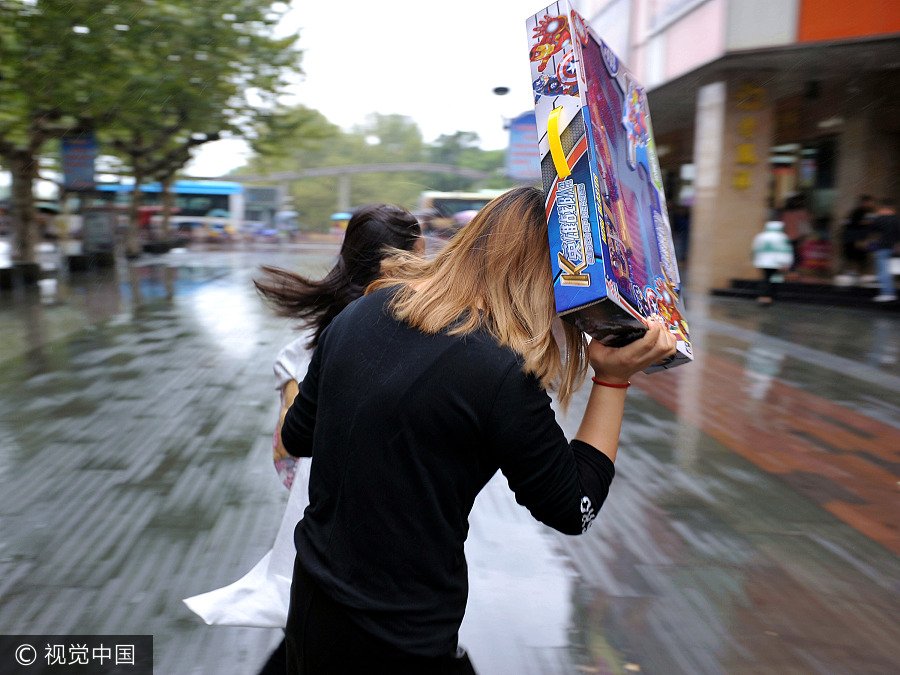Typhoon Khanun on Monday
Typhoon Khanun landed in Xuwen county, South China’s Guangdong province, at around 3:25 am on Monday (19:25 GMT on Sunday), bringing gales of 28 meters per second at its eye, according to local meteorological authorities.

It is the 20th typhoon to hit China this year.
Cities in Guangdong and neiboring areas will suffer heavy rain in the next 24 hours.
From Sunday to Monday morning, the typhoon will bring strong winds and torrential rains to southern and southeastern coastal regions, including parts of Shanghai and the provinces of Zhejiang, Guangdong and Hainan, Zhang said.
These regions have already seen more rain since the beginning of October, especially in the eastern parts of Hainan, where Sanya is situated. Precipitation is double what was recorded during the same period last year, she said.
The center continued with an orange alert-the second highest level in the four-color tiered system for severe weather-for Typhoon Khanun on Sunday morning. It warned the affected governments to take precautions to minimize casualties and economic losses from rain-triggered floods, mudslides or other disasters.
After making landfall on Monday morning, the typhoon is expected to weaken and turn southwest toward central Vietnam, Zhang said.
Confronted with the approaching typhoon and possible disasters, the State Flood Control and Drought Relief Headquarters activated a Level 2 emergency response on Sunday, urging local authorities to make thorough preparations.
In Guangdong, Hainan and Zhejiang, the major regions affected by the typhoon, around 60,000 fishing boats returned and over 150,000 residents relocated, according to the bureau.
China has seen fewer typhoons this fall than in the past. Only four formed from Sept 1 to Oct 14, which is three fewer than the 30-year average. But Typhoon Khanun may be the leading storm in a new active period, and one or two typhoons could form and affect China in the next two weeks, the center said.
Vietnam braced for typhoon Khanun on Monday after destructive floods battered the country’s north and center last week, killing 72 people, the disaster prevention agency said.
Last week’s floods were the worst in years, the government and state-run Vietnam Television said, with thousands of homes submerged. Another 200 houses collapsed and several towns remain cut off by the floodwater.
The floods also damaged more than 22,000 hectares (54,300 acres) of rice.
Vietnam is the world’s third-largest exporter of rice and the second-biggest producer of coffee, although the floods have not affected the Southeast Asian nation’s coffee belt.
Eighteen people from the hardest-hit province of Hoa Binh in the north were buried by a landslide, but only thirteen bodies have been found, Vietnam’s disaster agency said.
The government has said it is fixing dykes, dams and roads damaged by last week’s flood and is preparing for typhoon Khanun, which is expected to cause heavy rain in northern and central Vietnam from Monday.
It has also warned ships and boats to avoid the approaching typhoon.
Vietnam is prone to destructive storms and flooding due to its long coastline. A typhoon wreaked havoc across central provinces last month.
Floods have also affected nine out of 77 provinces in Thailand, Vietnam’s neighbor to the west. Three people had been killed in flooding since last Tuesday, Thailand’s disaster agency said on Monday.
The Thai capital, Bangkok, was hit by heavy rain at the weekend, with gridlocked traffic bringing parts of the city to a standstill. Bangkok has often been described as the “Venice of the East” because of its many waterways.
However, the floods prompted criticism of Bangkok’s city government, with some social media users accusing authorities of not managing water levels in canals properly.
The city government defended itself, saying it was working closely with the irrigation department. Thailand suffered its worst flood in five decades in 2011, with hundreds of people killed, industrial estates engulfed and key industries crippled.
No comments:
Post a Comment